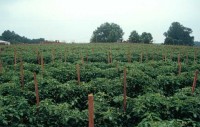Tomato Field Production
go.ncsu.edu/readext?183852
en Español / em Português
El inglés es el idioma de control de esta página. En la medida en que haya algún conflicto entre la traducción al inglés y la traducción, el inglés prevalece.
Al hacer clic en el enlace de traducción se activa un servicio de traducción gratuito para convertir la página al español. Al igual que con cualquier traducción por Internet, la conversión no es sensible al contexto y puede que no traduzca el texto en su significado original. NC State Extension no garantiza la exactitud del texto traducido. Por favor, tenga en cuenta que algunas aplicaciones y/o servicios pueden no funcionar como se espera cuando se traducen.
Português
Inglês é o idioma de controle desta página. Na medida que haja algum conflito entre o texto original em Inglês e a tradução, o Inglês prevalece.
Ao clicar no link de tradução, um serviço gratuito de tradução será ativado para converter a página para o Português. Como em qualquer tradução pela internet, a conversão não é sensivel ao contexto e pode não ocorrer a tradução para o significado orginal. O serviço de Extensão da Carolina do Norte (NC State Extension) não garante a exatidão do texto traduzido. Por favor, observe que algumas funções ou serviços podem não funcionar como esperado após a tradução.
English
English is the controlling language of this page. To the extent there is any conflict between the English text and the translation, English controls.
Clicking on the translation link activates a free translation service to convert the page to Spanish. As with any Internet translation, the conversion is not context-sensitive and may not translate the text to its original meaning. NC State Extension does not guarantee the accuracy of the translated text. Please note that some applications and/or services may not function as expected when translated.
Collapse ▲
A staked tomato field in the Piedmont of North Carolina. Field grown tomatoes lead retail market sales in the U.S.
Southeastern U.S. Vegetable Crop Handbook
This comprehensive resource was developed from research and Extension projects conducted at 12 land-grant universities, including NC State. The handbook contains everything tomato growers need, including which variety to plant, planting dates, fertilizer recommendations, cover crop selection and conservation tillage options, pesticide selection, fertigation, plasticulture, postharvest handling, alternative pest management tools and more.
Commercial Production of Staked Tomatoes in the Southeast
All of the information a grower needs to start producing staked tomatoes is in this guide from N.C. State University. Get advice on choosing cultivars; budget expected costs; learn about equipment; discover pest management practices, and consider marketing methods that will help sell staked tomatoes.
Fresh Market Tomato Production – Piedmont and Coastal Plain of North Carolina
Includes production basics in a nutshell including varieties, field preparation, pest control, and harvest expectations. Don’t miss the 10 tips for successful tomato production.
Tomatoes for Processing in Eastern North Carolina
A quick reference covering the production practices for tomatoes grown for processing. Selecting the appropriate varieties and training workers to harvest fully mature fruit are two aspects that differentiate growing for the processing market and growing for the fresh market.
A Closer Look At Production Practices
Fertigation: The Basics of Injecting Fertilizer for Field-Grown Tomatoes
Fertigation refers to injecting fertilizer into a drip irrigation system for field crops. Nutrients can be applied to plants in the correct dosage and at the time appropriate for a specific stage of plant growth.
The Stake and Weave Training System for Tomatoes in the Home Garden
Staking and weaving is a highly specialized production system used by commercial tomato growers. It is a system that can easily be adapted for home garden use. Some advantages of staking are improved fruit quality and yield, ease of harvest, less disease, improved spray coverage, larger fruit, and fewer damaged fruit or fruit with imperfections.
Additional Production Guides
The following resources are not North Carolina-specific; however, they contain general information that North Carolina growers may find valuable. Be sure to recognize differences in climate, disease pressure and seasonality as you review this material. For cultural information such as planting dates and pest control options for North Carolina tomato production, contact your local NC State Extension agent.
Commercial Tomato Production Handbook (University of Georgia)
This publication is a joint effort of the seven disciplines that comprise the Georgia Vegetable Team. It is comprised of 14 topics on tomatoes, including the history of tomato production, cultural practices, pest management, harvesting, handling and marketing. This publication provides information that will assist producers in improving the profitability of tomato production, whether they are new or experienced producers.
Frequently Asked Questions: Tomato, Pepper and Eggplant (Mississippi State University)
Tomato, pepper and eggplant are commonly grown using plastic mulch and drip irrigation. Extension personnel from Mississippi State University maintain a list of FAQs for commercial vegetable producers.
Tomato Production in Florida (University of Florida)
This is a comprehensive resource for Florida producers. Scope of information includes varieties, integrated pest management and cost considerations.
Tomato Breeding Program
The Fresh Market Tomato Breeding Program emphasizes the development of improved, disease resistant cultivars adapted to production in North Carolina and surrounding areas. The program has just published four research papers on trial breeding varieties.
- ‘Mountain Vineyard’ Hybrid Grape Tomato and Its Parents: NC 4 Grape and NC 5 Grape Tomato Breeding Lines
- ‘Mountain Majesty’: A Tomato Spotted Wilt Virus-resistant Fresh-market Hybrid Tomato and Its Parents NC 714 and NC 1CS
- ‘Mountain Honey’ Hybrid Grape Tomato and Its Parent NC 6 Grape Breeding Line
- ‘Mountain Vineyard’ Hybrid Grape Tomato and Its Parents: NC 4 Grape and NC 5 Grape Tomato Breeding Lines
Reviewed 7/12/2022.


